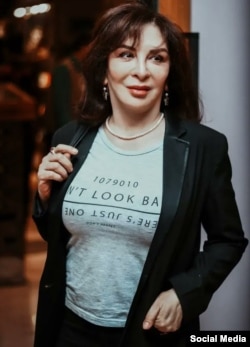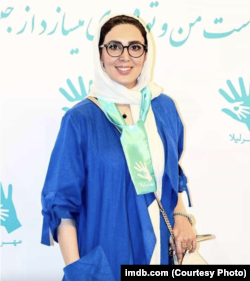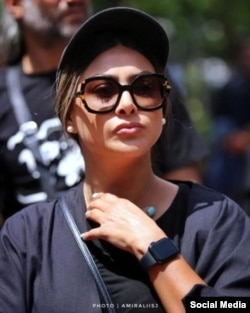Iran
Four Police Officers Killed In Attack Blamed On 'Terrorists' In Southeastern Iran
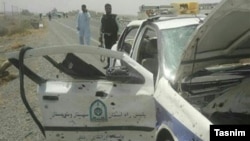
Four police officers were killed in an attack in Iran’s restive Sistan-Baluchistan Province, officials and state media reported on July 23. The Tasmin news agency, which is affiliated with Iran’s Islamic Revolutionary Guards Corps, blamed “terrorists” for the attack. No group has yet claimed responsibility. Sunni Muslims make up a majority in Sistan-Baluchistan but are only about 10 percent of the population in Shi'a-dominated Iran overall. The province, which has been the site of anti-government protests in recent months, borders Pakistan and Afghanistan. To read the original story by RFE/RL’s Radio Farda, click here.
More News
- By AFP
Iran Bans Film Festival Over Poster Of Actress Without Hijab

Iranian authorities have banned a film festival that put out a publicity poster featuring an actress who was not wearing a hijab, state media reported on July 23. The ban comes after the Iranian Short Film Association (ISFA) released a poster for its Short Film Festival featuring Iranian actress Susan Taslimi in the 1982 film The Death of Yazdguerd. "The culture minister has personally issued an order to ban the 13th edition of the ISFA Film Festival, after using a photo of a woman without a hijab on its poster in violation of the law," state news agency IRNA reported. The festival had been scheduled for September. To read the original story by AFP, click here.
- By Reuters
Iran Summons Danish Envoy To Protest Koran Burning In Copenhagen
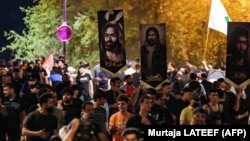
Iran's Foreign Ministry summoned the Danish ambassador to protest against "the desecration of the Koran in Copenhagen," the ministry tweeted on July 22. A day earlier, a man set fire to a book purported to be the Koran on a square across from the Iraqi Embassy in Copenhagen. Koran burnings are permitted in Sweden, Denmark, and Norway, which all have legal protections for freedom of speech. Iranian Supreme Leader Ayatollah Ali Khamenei said on July 22 that people who burned the Koran deserved the "most severe punishment." To read the original story by Reuters, click here.
- By Roya Maleki
Iranian Court Sparks Controversy By Diagnosing Hijab Protesters With Mental Illness

Judges in Iran have diagnosed three prominent actresses sentenced for not wearing the hijab as mentally ill, anti-family, and antisocial, prompting top psychologists in the country to condemn the "abuse of psychiatry and psychology in the judiciary."
The heads of four leading psychiatry boards in the country went public with their criticisms after actresses Azadeh Samadi, Leila Bolukat, and Afsaneh Bayegan were all recently given the diagnoses during their sentencing in a Tehran criminal court.
"The diagnosis of mental disorders is within the competence of a psychiatrist, not a judge. Just as the diagnosis of other diseases is in the competence of doctors, not judges," the psychiatrists wrote in an open letter to judiciary chief Gholamhossein Mohseni Ejei published by Iranian media on July 20.
The three actresses ran afoul of the law after they appeared in recent months in public without wearing headscarves, in violation of the country's strict hijab requirement that has fueled nationwide protests in recent months.
Many female celebrities have expressed solidarity with the demonstrations that followed the death of 22-year-old Mahsa Amini last September following her arrest for allegedly failing to wear the hijab.
Violators of the hijab requirement can face up to two years in prison, although proposed legislation would increase the maximum sentence to up to three years' imprisonment for repeat offenders.
Bayegan was given a suspended two-year prison sentence after she appeared at a film ceremony wearing a hat instead of a head scarf. An image of her at the ceremony that she posted on social media was reportedly presented as evidence during her trial.
Additional penalties for the 61-year-old film and television actress included a two-year travel ban, a two-year ban on using the Internet, social media, and mobile services, and a requirement to read and summarize an unnamed book within two months.
Ahead of her sentencing this week, Bayegan announced on July 12 that she was retiring from the "dishonorable field of acting" after she was summoned to court.
Bolukat, 42, was earlier handed a sentence of six months imprisonment, along with a ban on professional activities for two years, on charges she had "damaged public morality and chastity" by posting images of herself without a hijab on social media. Bolukat was also prohibited from leaving the country and ordered to read and provide a summary of an unnamed book within a month.
The 44-year-old Samadi, who was detained after wearing a hat instead of a hijab while attending a funeral, did not receive a prison sentence during her court appearance earlier this month but was denied access to her phone for six months and all her social media accounts were ordered disabled.
The addition of mental health diagnoses of "antisocial and anti-family" behavior alongside the women's sentencing, requiring regular psychological treatment and certifications of good mental health were judgments that the top psychiatrists say the courts were not qualified to make.
"What is stated in the text of the ruling as an argument for diagnosing a disease called antisocial personality is not proportionate, logical, or convincing," wrote the heads of the Scientific Association of Psychosomatic Medicine, Scientific Association of Psychiatrists, Scientific Association of Psychotherapy, and the Psychological Association of Iran.
The joint letter added that the diagnosis of "mental illness and anti-family personality" was "unscientific and strange" and was unfathomable to psychiatric professionals.
The letter called on the authorities to amend the sentences against the three actresses.
Mohammad Hossein Aghasi, a Tehran-based lawyer, told RFE/RL's Radio Farda on July 21 that the sentences suggested that "judges in these cases did not fully grasp legal principles or they must have been very nervous and upset at the accused and wanted to sentence [them] to degrading punishments."
Other actresses have also been targeted with arrests and harassment after protests against the hijab broke out across the Islamic republic following Amini's death.
Last week, the deputy minister of Islamic culture and guidance, Mohammad Hashemi, announced that the government had taken steps to prevent a film company from hiring an actress who had refused to wear the hijab. While Hashemi did not provide a name, media reports suggested he was referring to 44-year-old Shaghayegh Dehghan, who was charged in June for posting a photo of herself without a hijab on social media.
Citing the pressure of an "angry society," the award-winning actress Hengamah Ghaziani recently retired at the age of 53 following her arrest for not wearing a head scarf. Actresses Taraneh Alidoosti, 39, and Katayun Riahi, 61, were also arrested.
The acting and film community has rallied around the actresses, with the Association of Directors and the Union of Cinema Producers of Iran issuing a joint letter this week calling the sentences against Bolukat and Samadi an "insult to the conscience of all cinema people."
"We stand fully alongside all the female actresses of Iranian cinema and filmmakers who are cruelly humiliated by similar rulings," the letter read.
Written by Michael Scollon based on reporting by Roya Maleki and other RFE/RL Radio Farda correspondents
Iranian Activists Urge UN Rights Chief To Intervene As Fears Of Boxer's Imminent Execution Grow
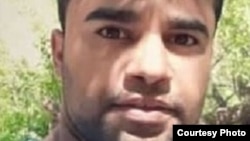
Dozens of human rights activists have urged Volker Turk, the United Nations high commissioner for human rights, to intervene and try to halt the imminent execution of Mohammad Javad Vafaei Sani, who was arrested in Iran in 2020 following unrest over a sharp hike in gas prices.
The plea, signed by 85 lawyers, human rights activists, and NGO representatives, urges Turk to step in publicly and exert whatever pressure possible to prevent the execution of the 27-year-old former boxing champion.
The Iranian Human Rights Center reported on July 20 that Vafaei Sani had been informed his death sentence is now definite and that he has been moved to an undisclosed location. It added there is currently a lack of information regarding his status and whereabouts, leading to fears authorities are preparing to carry out his death sentence.
The United Nations Human Rights Office confirmed receipt of the letter and said it is under review.
Vafaei Sani was arrested in March 2020 following his participation in protests over a sudden gas price hike in November of the previous year. He was accused of "instigating and deliberately causing damage to certain sites, inclusive of governmental edifices."
Babak Paknia, the lawyer handling his case, stated in December 2022 that the court found Vafaei Sani guilty of "corruption on Earth" and subsequently sentenced him to death.
Since being sent to prison, he has reportedly been subjected to torture in an effort to extract a confession that he supports the People's Mujahedin of Iran, which is outlawed in Iran.
The rate of executions in Iran has been rising sharply, particularly in the wake of widespread protests that swept across the country last year following the death of 22-year-old Mahsa Amini while in police custody for an alleged head scarf violation.
Amnesty International says the regime in Tehran executes more people than any other country in the world other than China, while the Abdorrahman Boroumand Center, a Washington-based organization specializing in Iranian human rights research, said in a recent report that 135 executions were carried out in Iran in May alone.
The letter to Turk from the human rights activists says the wave of executions is a "ruthless attempt by the Islamic republic authorities to instil fear and quell a population that is no longer prepared to tolerate a corrupt and tyrannical regime."
Written by Ardeshir Tayebi based on an original story in Persian by RFE/RL's Radio Farda
Iranian Activist Gholian Thrown Out Of Court After Refusing To Wear Head And Body Covering
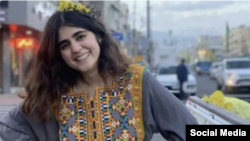
Iranian rights activist Sepideh Gholian was removed from a court during a public session of her trial because she refused to accept a judge's order to wear a "chador," a traditional full-body cloak that leaves only the face exposed.
The judiciary-affiliated Mizan news agency said Gholian entered the court on July 19 with a "very small" piece of cloth on her head, which she later removed, prompting the judge to order her removal.
Gholian's lawyer, Amir Raeisian, confirmed the incident and said the hearing was subsequently postponed.
He told the Shargh newspaper that Gholian had agreed to wear a head scarf, "but since the court insisted on a chador, she did not agree and the court hearing was not held."
Gholian is on trial over a complaint from an Iranian state television reporter after Gholian implicated her in coercing the activist to make a forced confession. She activist has accused the reporter of working hand in hand with security officials.
In a letter sent from Evin Prison on July 18, Gholian expressed her readiness to face the court despite earlier statements that she would not participate in the proceedings of "show court of the Islamic republic."
Instead, she said she had no fear of recounting the truth in public and was prepared to defend herself.
It was the second court hearing for Gholian in 10 days.
On July 10, an appeals court in Tehran confirmed a two-year prison sentence handed to the activist for chanting a slogan against Iran's supreme leader shortly after being released from detention.
She was originally arrested along with more than a dozen activists, protest organizers, and workers during the Haft Tappeh Sugar Factory strike in November 2018. While most were released on bond the next day, Gholian was imprisoned for a month.
Her release from prison in Ahvaz in December 2018 was short-lived as she was again arrested in January 2019 after Iranian state television aired footage in which it purported to show Gholian confessing to taking part in alleged Western-backed efforts to overthrow the government.
She promptly countered those accusations on social media by saying she had been beaten and forced to make a false confession.
Unrest has rattled Iran since last summer in response to declining living standards, wage arrears, and a lack of insurance support. Labor law in Iran does not recognize the right of workers to form independent unions.
Adding to the dissent, the September death of 22-year-old Mahsa Amini while in police custody for allegedly wearing a head scarf improperly breathed new life into demonstrations, which officials across the country have since tried to quell with harsh measures.
The activist HRANA news agency said that more than 500 people have been killed during the unrest, including 71 minors, as security forces try to stifle widespread dissent.
Thousands have been arrested in the clampdown, with the judiciary handing out harsh sentences -- including the death penalty -- to protesters.
Written by Ardeshir Tayebi based on an original story in Persian by RFE/RL's Radio Farda
- By Mehdi Tahbaz
Return Of 'Morality Police' To Iranian Streets Leaves Women Fearful But Defiant

The return of the so-called morality police to the streets of major Iranian cities has brought back fear and stress for women who choose to ignore the requirement that they wear the hair-covering hijab. But it has also been met with resistance by men and women alike, while lawmakers have questioned the effectiveness of the hard-line approach to enforcing compliance.
Iranians who spoke to RFE/RL's Radio Farda said the presence of the morality police -- officially known as "guidance patrols" that usually include male officers and women wearing black chadors -- is not as visible as it was before the patrols were scaled back after nationwide protests first broke out against the hijab law last autumn.
I really don't know where they want to get with this method, but in my opinion, if they want to continue this way, confrontations will start again."-- Male Tehran resident
"Before, when we went on the street, they had a stationary vehicle, or a vehicle that was moving on the street," Leila Mirghaffari, a women's rights activist who lives in Tehran, told Radio Farda on July 17, a day after the return of the morality police was announced. "They haven't yet dared to encroach like before. But they are present, mostly in main squares."
Mirghaffari described the decision to redeploy the morality police, coming after the monthslong protests had largely wound down, as a distraction aimed at creating "fear and terror" among the population.
"It creates mental and emotional problems for us. It's stressful, and it occupies our thoughts and those of our families," Mirghaffari said. "When we want to leave home and come out to the street, at any moment we may travel a route where morality police patrol and are stationed to arrest people."
Nevertheless, Mirghaffari and others suggested, the patrols are largely ineffective and have even given new life to resistance against the authorities' efforts to enforce the country’s strict Islamic dress code.
Some Tehran residents who spoke to Radio Farda said that many women simply put on a hijab when they spot the morality police before quickly removing them once out of sight. And in some cases where women have been harassed or threatened by morality police, fellow citizens -- male and female alike -- have pushed back.
Almost immediately after the authorities announced on July 16 that the morality police patrols would resume, residents of the northern city of Rasht took to the streets to protest an attempt to arrest three women for allegedly violating the hijab requirement.
The situation reportedly escalated into clashes between demonstrators and police, who used tear gas to disperse protesters, some of whom were chanting against Iran's clerical establishment.
"I really don't know where they want to get with this method, but in my opinion, if they want to continue this way, confrontations will start again," said a male Tehran resident who requested anonymity while answering questions on WhatsApp.
"Personally, if I see them taking a girl into a van, I will step forward and shout so as not to let them take them. That's how things are, and I think most people now are like me. They don't want the Mahsa incident to happen again and for another innocent girl to be killed."
The death of 22-year-old Mahsa Amini in September, soon after she was arrested for allegedly violating the hijab law, sparked the nationwide protests that lasted months and prompted a crackdown that led to the deaths of more than 500 people. Amini's death became the cause célèbre for thousands of women and men who took to the streets to show their opposition to the hijab law.
Amid the protests, there were reports that the authorities had disbanded the morality police, although other reports indicated that they never really went away in some cities. But the issue also prompted the clerical establishment, which views the hijab as key to its interpretation of Islam, to introduce revisions to the country's Chastity and Hijab Law that would introduce stiffer penalties for noncompliance, including up to three years in prison for repeat offenders.
While the hijab has been compulsory in public for women and girls over the age of 9 since 1981, shortly after the 1979 Islamic Revolution ushered in the clerical establishment, the requirement is often flouted, particularly in urban areas.
The Chastity and Hijab bill, which is awaiting parliamentary approval, has been fodder for intense debate -- with some lawmakers saying it does not go far enough to make women comply with the hijab requirement and others questioning the effectiveness of forcing women to comply.
Following the announcement that the morality police patrols would resume in many Iranian cities, lawmaker Vali Esmaili, who heads the parliament's social commission, said that the body would unlikely be involved in the effort.
He also said that before resuming the patrols, "we should first look at the state of society to see if such actions have been effective in the past 43 years."
The Chastity and Hijab bill also proposes penalties, including the confiscation of automobiles, against drivers or passengers of vehicles in which women are not in compliance with the hijab requirement.
"When I'm driving, I have to wear a hijab," a woman who resides in Tehran told Radio Farda following the redeployment of the morality police, explaining that she has had her vehicle impounded four times for failing to wear the hijab. "But when I get out and move away from the car, I take off my head scarf. Many times, I just put it in my bag. Sometimes, when I see that the conditions are bad, I keep it around my neck, but I am still without a hijab in the street."
The woman said that she has not personally seen any morality police since they returned to the streets of Tehran. But she has heard eyewitness accounts of the presence of marked morality police vehicles in the northern city of Shahriar, in Tehran Province, where she said most women wear head scarves and those who do not could be seen without a hijab not far from the morality police.
WATCH: Masses of demonstrators are turning out throughout Iran, where some are shouting down police enforcement of strict religious dress codes for women.
"There are the odd ones out who are without a hijab, and they were 100 or 200 meters away from the morality police," she recalled being told of the current situation.
She said that even before the morality police returned to the streets, her experience in dealing with them showed that they were reluctant to enforce the hijab requirement.
"It's pretty clear that they're tired of this matter, but it seems like they have orders from above," she said.
That is far from the norm, according to the activist Mirghaffari, who painted a dark picture of the morality police, whose involvement in human rights violations has led to Western sanctions.
"The morality police are truly violent. They are really repressive. They have no humanity," said Mirghaffari, who added that she has been arrested by the force several times. "The morality police are really trained for savagery and for causing distress to the point that someone like Mahsa Amini could be killed. And they have no fear at all."
Others who spoke to Radio Farda were incredulous that the authorities would reintroduce the morality police amid public frustration over Iran's dire economic situation.
"The issue is not the hijab. The real issue is the terrifying inflation and high prices," said the man who answered questions by WhatsApp. "But they are only fixated on the hijab. They are playing with everyone's nerves, whether man or woman, whether with a hijab or without, they are bothering everyone."
The renewed protests, which included women carrying placards bearing the "We won't go back!" slogan that became popular during anti-hijab demonstrations, suggests that efforts to force women into compliance will be met with continued resistance.
"Look, our girls are fighting and know that there is no way back for us and we are not going back, and our answer to them wanting to forcibly put a hijab on us is, 'No!'" said Mirghaffari. "This is a big step we have taken to reach our other desires and we will never go back."
Written by Michael Scollon based on reporting by Mehdi Tahbaz and other Radio Farda correspondents.
Six Iranians Detained For Participating In Mixed-Gender Yoga Class
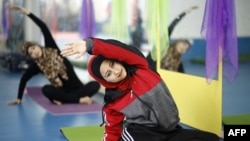
Officials in Iran's Gilan Province have shut down a yoga club and detained one male instructor and five female participants in the city of Rasht because they were practicing the exercise regime together.
The state-run news agency IRNA reported on July 19 that police launched an investigation after receiving a tip about the operation of a mixed-gender yoga club. The raid was initiated after "discreet" investigations confirmed the report, according to IRNA.
Those arrested have been referred to the judiciary and a case file has been formed against them, the agency reported.
Since the Islamic Revolution in 1979, men and women in Iran have been prohibited from participating in sports activities together, with no official mixed-gender sports clubs existing in the country. Yoga is a legal activity as long as classes are single-sex and the teacher is licensed.
Anger over the suppression of human rights, and women's rights in particular, has boiled over since last September when 22-year-old Mahsa Amini died while in police custody. She was being held for an alleged violation of the hijab law, which makes it compulsory for women and girls over the age of 9 to cover their heads when out in public.
While the protests appear to have waned slightly in recent months, resistance to the hijab is likely to increase, analysts say, as it is seen now as a symbol of the state's repression of women and the deadly crackdown on society.
The wave of government intervention against those violating the law has been met with stiff resistance from women.
The campaign against the compulsory hijab has grown so widespread that Abdolhossein Khosropanah, the secretary of the Supreme Council of the Cultural Revolution, conceded in June that while women defying the hijab law should technically be arrested, the large numbers of women involved made such a mass arrests unfeasible.
In recent weeks, authorities have broadened their crackdown on the issue, shutting down businesses, restaurants, cafes, and in some cases pharmacies due to the failure of owners or managers to enforce Islamic laws and hijab rules.
In the face of the unrest, some religious and government figures have repeatedly advocated for a tougher stance by the government against offenders.
Written by Ardeshir Tayebi based on an original story in Persian by RFE/RL's Radio Farda
Iranian Retirees Protest Living Conditions, Lack Of Pension Increases
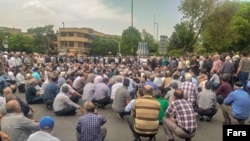
Iranian retirees have renewed protests in several major cities across the country, reiterating calls for more social and economic freedoms, as well as regular adjustments to their pensions in line with inflation as the cost of living soars amid international sanctions.
According to reports on social media outlets, the protests took place on July 19 outside the pension fund offices and provincial buildings in cities including Kermanshah, Yazd, Shiraz, Hamedan, Ardabil, Karaj, Qazvin, and Sanandaj.
Images and videos shared online showed protesters holding placards calling for the release of imprisoned trade activists and other political prisoners.
Participants also voiced their frustrations over the failure of the country's leaders to improve living conditions with slogans such as "Incompetent government, shame, shame," "We won't rest until we secure our rights," and "Enough of promises, our tables are empty."
The demonstrations by retirees come after the government recently announced a decision to consolidate 18 different pension funds into one in an attempt to address a shortfall of 3,000,000 billion Iranian Rials ($6 billion) and rising debts.
For more than a decade, the Iranian government has been staving off the crisis in the pension funds through various measures such as allocating shares, transferring factories, and even gifting land to offset debts.
Despite these efforts, official reports indicate that out of the 18 pension funds in Iran, 17 were either bankrupt or teetering on the brink of bankruptcy.
Iran's economy has been ravaged by U.S. sanctions, leading to a surge of protests in several cities. A report from the Labor Ministry indicated a significant increase in Iran's poverty rate, growing 50 percent in 2021 compared to the previous year.
The protests on July 19 weren't limited to pensioners with a series of separate protests occurring across the country, showing the depth of anger following years of what demonstrators say is negligence and corruption in the public sector.
Disabled individuals demonstrated outside Tehran's city administration building, while teachers rallied in Shiraz, and workers from the Haft Tappeh Sugar Cane Complex held a protest outside the Development and Ancillary Industries Company in Ahvaz.
Unrest has rattled Iran since last summer in response to declining living standards, wage arrears, and a lack of welfare support. Labor law in Iran does not recognize the right of workers to form independent unions.
Adding to the dissent, the death in September of 22-year-old Mahsa Amini in police custody for allegedly wearing a head scarf improperly breathed new life into the demonstrations, which officials across the country have tried to quell with harsh measures.
Written by Ardeshir Tayebi based on an original story in Persian by RFE/RL's Radio Farda
Iran Warns Against Unloading Iranian Oil From Seized Tanker

Iran would retaliate against any oil company unloading Iranian oil from a seized tanker, the Revolutionary Guards' navy commander, Alireza Tangsiri, said on July 20, according to state media. In April, the U.S. confiscated Iranian oil on a tanker at sea in a sanctions enforcement operation, according to a maritime security firm. Tangsiri added that Tehran would hold Washington responsible for allowing the unloading of the tanker's content. Sources familiar with the matter who declined to be identified had said Washington took control of the oil cargo aboard the Marshall Islands tanker Suez Rajan after securing an earlier court order. To read the original story by Reuters, click here.
Iran Targets Actresses For Hijab Violations With Psychological Punishments Criticized As 'Insulting'

Afsaneh Bayegan has become the latest actress to be convicted for her public opposition to Iran's mandatory hijab law after being sentenced to two years in prison, as well as mandatory psychological treatment for what the court termed an "anti-family personality disorder."
Bayegan's sentence, handed down on July 19, follows similar punishments given to actresses Azadeh Samadi and Leila Bolukat as the Islamic regime cracks down on dissent over the hijab law following nationwide unrest sparked by the death in September of Mahsa Amini while in police custody for an alleged head scarf violation.
The recent usage of psychological treatment and other controversial punishments such as being made to wash corpses has outraged rights activists, who accuse the judiciary of disregarding human rights.
Azadeh Samadi's sentence, issued by Tehran's Criminal Court on July 18, stipulates that she must visit psychiatric centers "every two weeks" for treatment for an "anti-social disease," culminating in a "certificate of health" to be presented to authorities, according to Iranian media.
Bolukat was sentenced to a one-year prison term for defying the country's dress code by wearing a hat in place of a hijab.
WATCH: Masses of demonstrators are turning out throughout Iran, where some are shouting down police enforcement of strict religious dress codes for women.
Mehdi Kouhian, from the legal and judicial follow-up committee for the Iranian Cinema House, said Bayegan has to make weekly visits to psychiatric centers for her "anti-family personality disorder" and then "present a health certificate at the end of the treatment period."
Bayegan, a veteran cinema and television actress, wore a hat in public.
Kouhian, a filmmaker and attorney, outlined additional penalties for Bayegan in a tweet, including a requirement to read and summarize a book within two months, a two-year travel ban, and a two-year ban on direct or indirect use of cyberspace. Kouhian criticized the Criminal Court for its use of "disgusting and shocking language."
The Iranian Director's Guild and the Producers' Union reacted to the judgments on July 19 by releasing a joint statement calling the punishments an "insult to the intelligence of all cinema professionals." They also pledged full support to all female Iranian cinema actors and filmmakers affected by such rulings.
These verdicts are causing a backlash on social media and among filmmakers, with the country's actresses increasingly appearing in public without observing the mandatory hijab to show their opposition.
Such acts of civil disobedience have increased in Iran -- where the law requires women and girls over the age of 9 to wear a head scarf in public -- since Amini's death.
While the protests appear to be waning, resistance to the hijab is likely to increase, analysts say, as it is seen now as a symbol of the state's repression of women and the deadly crackdown on society.
Several Iranian cinematographers and prominent public figures have also been summoned by the police or arrested, including director Hamid Porazari.
Written by Ardeshir Tayebi based on an original story in Persian by RFE/RL's Radio Farda
Baha'i Educator, Once Imprisoned For Five Years, Taken Into Custody In Iran
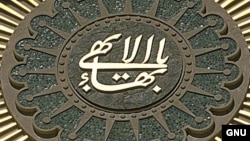
Keyvan Rahimian, a member of the Baha'i faith in Iran, has been detained by officers from the Intelligence Ministry and subsequently transferred to Evin Prison.
His daughter, Jina Rahimian, reported the arrest on her Instagram page on July 19, explaining that the intelligence officers had arrived at their Tehran residence and taken her father into custody.
In her post, Rahimian added, "Dad called and said he's in Evin and he's OK."
There was no official information regarding the charges that led to the arrest of Rahimian, who has previously been detained for his role as an educator at the online Baha'i University. He was sentenced in 2011 to a five-year term of punitive imprisonment for his association with the faith. He was released in September 2017.
Iran accuses Baha'is of having links to Israel, where the city of Haifa hosts a center of the Baha'i faith. Baha'i leaders reject the allegations and say they are used as a pretext to persecute members.
There are some 300,000 Baha'i adherents in Iran and an estimated 5 million followers worldwide. In Iran, where their faith is not officially recognized in the constitution, its leaders say they face systematic persecution.
Iranian Supreme Leader Ayatollah Ali Khamenei has on several occasions called the Baha'i faith a cult and, in a religious fatwa issued in 2018, he forbade contact, including business dealings, with followers of the faith.
Since the Islamic Republic of Iran was established in 1979, hundreds of Baha'is have been arrested and jailed for their beliefs. At least 200 have been executed or were arrested and never heard from again.
Thousands more have been banned from receiving higher education or had their property confiscated, while vandals often desecrate Baha'i cemeteries.
Written by Ardeshir Tayebi based on an original story in Persian by RFE/RL's Radio Farda
Iranian Protests Spread Over Morality Police Crackdowns
Masses of demonstrators are turning out throughout Iran, where some are shouting down police enforcement of strict religious dress codes for women. The country's so-called morality police have resumed patrols after keeping a low profile amid nationwide outrage following the death of an Iranian woman, Mahsa Amini, in September 2022 in police custody. She had been charged with not wearing a head scarf, or hijab, properly.
Iranian Women's Rights Official Says Gender Justice No Longer Needed In Policy Plan
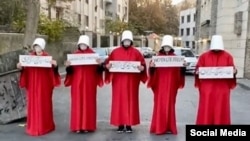
Iran has removed gender justice from the country's latest development program, sparking an outcry among activists who say the Islamic regime continues to marginalize women's rights even as widespread unrest over their suppression rocks the country.
The vice president for women and family affairs, Ensieh Khazali, said in an interview with the Tehran-based ISNA state news agency on July 18 that “the Iranian government had deemed gender justice as already implemented and, therefore, unnecessary to be included in the upcoming program.”
The Islamic leadership's development plan, now in its seventh edition, previously mentioned protecting the "well-being of families and integrity along with women's social, political, and economic empowerment and aimed at creating a balance among the multiple roles played by women to help with their effectiveness in the family and society."
Despite the stated policy, Iran's ranking in the 2023 Global Gender Gap Report placed the country 143rd out of 146 countries.
The annual report by the World Economic Forum measures equality between men and women using a variety of indicators, from access to education and public health to participation in economic and political affairs.
Khazali disputed the ranking claiming the statistics are flawed.
But women's rights activists have pointed to it as evidence of their claims during recent nationwide protests that fundamental amendments to the country's constitution to guarantee equal rights and diversity are needed.
They have also called for the implementation of a proposed Women's Legal Bill to ensure an "accurate and concise reflection of women's struggles and demands throughout history" and in future legal regulations, such as any new constitution that may be drawn up.
Anger over the death of Mahsa Amini while in police custody has prompted thousands of Iranians to take to the streets nationwide to demand more freedoms and women's rights. The widespread unrest represents the biggest threat to the Islamic government since the 1979 revolution.
Amini's death, which officials blamed on a heart attack while witnesses and her family say it was the result of being beaten by police, touched off a wave of anti-government protests in cities across the country.
The authorities have responded to the unrest with a harsh crackdown that rights groups say has killed more than 500 people, including 71 children.
Written by Ardeshir Tayebi based on an original story in Persian by RFE/RL's Radio Farda
Thousands Of Iranians Sign Petition Chiding Authorities For Treatment Of Teachers
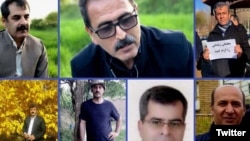
Thousands of Iranians, including active and retired teachers and cultural figures, have added their signatures to an online petition critical of the government and calling for the release of scores of educators who have been imprisoned in recent months for their support of protesters demanding more freedoms.
The campaign, initiated by cultural figures across the country, is characterized as a "civil action" and a "small yet vital step" toward liberating the more than 230 teachers and their union activists to have been detained by security agents .
It said that as of July 17, more than 13,000 signatures had been received and that several teachers union associations, including those from Tehran, Markazi, North Khorasan, Kurdistan, and Islamshahr, have voiced their support for the campaign as well.
According to the campaign's official statement, the government's engagement with educators has been marked by "violence and oppressive measures."
It criticizes prison sentences handed to protesting teachers in various provinces, and chides the government for initiating legal proceedings that have resulted in dismissals, forced retirements, and expulsions for hundreds more teachers nationwide.
Unrest -- including several protests by teachers -- has rattled Iran since last summer in response to declining living standards, wage arrears, and a lack of welfare support. Labor law in Iran does not recognize the right of workers to form independent unions.
The death of 22-year-old Mahsa Amini while in police custody in September for allegedly wearing a head scarf improperly breathed new life into the unrest, which officials across the country have tried to quell with harsh -- and sometimes deadly -- measures. Universities and other educational and cultural centers have been the sites for many of the protests.
The campaign initially started with 1,200 teachers penning a letter to the head of the judiciary calling for the immediate release of imprisoned teachers and trade union activists and demanded an end to the security confrontations with teachers.
When the judiciary and the presidential office reportedly declined to acknowledge the letter, the campaign was widened by taking it public.
According to activists, more than 11 teacher trade union rights leaders, including notable figures such as Esmail Abdi, Rasol Badaghi, Farzaneh Nazaranpour, and Jafar Ebrahimi, are currently serving prison sentences or under temporary arrest.
The activist HRANA news agency says that more than 500 people have been killed during the unrest, including 71 minors, as security forces try to stifle widespread dissent.
Thousands have been arrested in the clampdown, with the judiciary handing down harsh sentences -- including the death penalty -- to protesters.
Written by Ardeshir Tayebi based on an original story in Persian by RFE/RL's Radio Farda
Iranian Singer Nyusha Qurbani Reportedly Taken From Stage By Security Agents
Witnesses said Iranian singer Nyusha Qurbani was taken from the stage by plainclothed security agents while performing with her chamber music group Ataq Band on July 17. Several social media users reported the incident and said her whereabouts are still unknown. There was no official comment from authorities, and no further details were immediately available. To read the original story by Radio Farda, click here.
Iranian Institute Shut For Including Protests, Critical Poems In Exam
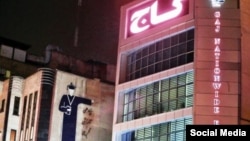
The Gaj educational institute, a provider of supplemental educational materials and university entrance exam books in Iran, has been shut down after reports that one of its exams being used by schools included mentions of protests that have rocked the country and poems critical of the regime.
Ahmad Mahmodzadeh, the head of the Nongovernmental Schools Organization, disclosed in a television program on July 17 that the institute had set exam questions with an apparent pro-protest bias, leading to its closure.
Mahmodzadeh didn't give details on the questions that appeared on the exam, but he added that the education minister has issued a directive calling for a cessation of all advertisements for the Gaj institute across all media.
However, in December, the Farhikhtegan newspaper claimed that the institute had selected what it called "targeted and dark" poems to use in a literature exam.
The newspaper cited the use of verses by Mohammad Farrokhi Yazdi, a noted dissident poet and journalist from the era of the Persian Constitutional Revolution era, in its criticism. One excerpt from a poem included in the exam read: "The bloodshed of Zahhak in this kingdom has surged; Where is Kaveh who would raise leather on a stick as a purge?"
Zahhak is an infamous king in Persian mythology, depicted with two snakes on his shoulders that fed on human brains. Often referenced in contemporary Iranian discourse, Zahhak symbolizes despotism and is a rallying point for rebellion and Kaveh the blacksmith is a legendary figure in Iranian mythology known for leading a revolt against this tyrannical ruler.
Amid an escalation of nationwide protests following the September 2022 death of Mahsa Amini, Iran's schools, particularly girls' schools, became focal points for unrest.
The Gaj institute, which has a rich history of producing educational materials ranging from preschool to university entrance exam levels, also ran preparatory tests for students in addition to its publishing activities.
The shutdown of such a significant private institution coincides with the government's shuttering of some businesses that have expressed support for the protesters, particularly those supporting strikes.
In a similar crackdown last December, the prominent Cheshmeh Publications bookstore in Tehran was closed by judicial order.
Restrictions have also been tightened at other educational institutions, with teachers under increased pressure and many students facing severe disciplinary actions for participating in protests.
As the first anniversary of Mahsa Amini's death approaches, the government has stepped up its crackdown on women's and girls' right to freedom of dress, officially resuming morality police patrols from July 16.
Written by Ardeshir Tayebi based on an original story in Persian by RFE/RL's Radio Farda
Protests Erupt In Northern Iran Amid Attempts To Enforce Hijab Rules
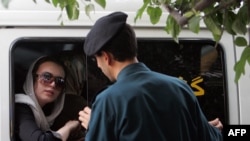
Protests have erupted in the northern Iranian city of Rasht following an attempt by government officials to arrest three women over violations of mandatory hijab rules amid reports that the country's leadership has ordered the resumption of so-called “morality police” patrols.
Reports suggest that the situation escalated late on July 16 when some sections of the crowd began chanting "Death to [Iranian Supreme leader Ayatollah Ali] Khamenei" after the officials tried to apprehend the women for dress code infractions. Plainclothes individuals attempted to disperse the crowd using tear gas, leading to clashes between the group and the officials.
The same evening, a spokesperson for the Islamic Republic's law enforcement announced the deployment of vehicle and foot patrols to combat what he referred to as "improper" hijab usage. He warned that those who continue to defy norms with the dress would be confronted.
The morality police patrols were suspended following months of unrest sparked by the September 2022 death of Mahsa Amini while she was in police custody for an alleged head-scarf violation. Amini's family has said she had no history of health problems and was beaten during her detention.
The return of the patrols has been met with anger, especially in light of recent citizens' reports on social media of an increase in vans carrying morality patrol officers in the streets, particularly in large cities. The morality patrols have been sharply criticized by the European Union, the United States, the United Kingdom, and some Western allies for their role in suppressing women and violating human rights.
Unrest has rattled Iran since last summer in response to declining living standards, wage arrears, and a lack of insurance support. Labor law in Iran does not recognize the right of workers to form independent unions.
Amini's death breathed new life into demonstrations, which officials across the country have since tried to quell with harsh measures.
Many women across the country have openly challenged the mandatory head scarf law, with many appearing in public without their hijab, or defiantly taking it off in protest.
The activist HRANA news agency said that more than 500 people have been killed during the unrest, including 71 minors, as security forces try to stifle widespread dissent.
Thousands have been arrested in the clampdown, with the judiciary handing down harsh sentences -- including the death penalty -- to protesters.
Written by Ardeshir Tayebi based on an original story in Persian by RFE/RL's Radio Farda
- By RFE/RL
Iranian Women Continue To Defy Head-Scarf Law As 'Morality' Patrols Return
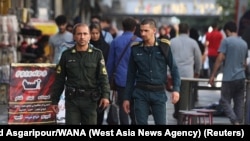
Two policemen walk through Tehran on July 16. The officer on the left is wearing the standard green uniform that is worn by units of the morality police.
After protests that shook Iran and led to countless women opting to remove their head scarves, patrols of morality police have been seen on the streets once more following months of relative inactivity.
Iran Reportedly To Resume 'Morality' Patrols To Enforce Hijab Compliance

Iran will reportedly resume so-called morality police patrols aimed at enforcing the country's laws on women wearing head scarves, or hijab.
Iranian police spokesman Saeed Montazerul-Mahdi said on July 16 that the patrols will crackdown on those wearing "extraordinary clothing" in public and who "insist on breaking the norms."
The statement came amid a flurry of unconfirmed social media posts regarding purported sightings of police vans patrolling several Iranian cities.
Police arrested actor Mohammed Sadeghi after he posted a video in response to another online video showing a woman being detained by the morality police. "Believe me, if I see such a scene, I might commit murder," he said.
The website of the semiofficial Hamshahri daily newspaper, which is affiliated with the Tehran municipality, said he was arrested for encouraging people to use weapons against the police.
The morality police patrols were suspended following months of unrest after the September 2022 death of Mahsa Amini while she was in police custody for an alleged head-scarf violation. Amini's family has said his daughter had no history of health problems and was beaten during her detention.
At least 500 people were killed in the unrest, and tens of thousands were detained. On May 17, the head of Iran’s judiciary announced that about 90,000 protesters had been pardoned by Supreme Leader Ayatollah Ali Khamenei.
The protests have been seen as one of the biggest threats to the Islamic government since it took power in 1979 as the unrest tapped into broader discontent over government corruption, economic mismanagement, and oppression.
Earlier this month, Iranian authorities stepped up pressure on commercial and recreational venues, shutting down dozens of cafes, restaurants, and other businesses for purportedly failing to enforce the head-scarf laws on their premises.
Closures were reported in Tehran, Islamshahr, Eshtehard, Parand, Rasht, and Motel Qu.
The hijab was made compulsory for women and girls over the age of 9 in 1981, two years after the Islamic Revolution in Iran. The move triggered protests that were swiftly put down by the government. Many women have flouted the rule over the years and pushed the boundaries of what officials say is acceptable clothing.
In the face of unrest, some religious and government figures have repeatedly advocated for a tougher stance by the government against offenders, even going as far as encouraging a "fire at will" approach against noncompliant women.
With reporting by AP
Iranian Students Slam Government Over Move To Admit Iraqi Militants
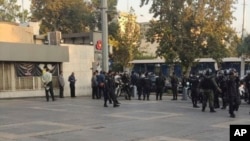
Iranian students have slammed a government decision to admit members of Iraq's Popular Mobilization Forces (PMF) to local universities, characterizing the move as a "militarization" of school campuses.
Student groups from Tehran University on July 14 said they would resist the presence of the militants on campus, “regardless of whether they are in combat or academic attire,” while the Free Association of Tehran’s Polytechnic University issued a statement describing the decision to allow Shi'ite paramilitaries from Iraq into Iranian universities as a "new war" aimed at suppressing student protests.
Universities and students have long been at the forefront of the struggle for greater social and political freedoms in Iran and following recent nationwide protests -- which have provided the biggest threat to the Islamic regime since the revolution in 1979 -- pressure has increased on universities across the country.
Officials have arrested student activists and leaders, sentencing them to prison and banning them from studying, while increasing surveillance on campuses to enforce dress codes.
Many have faced sentences such as imprisonment, flogging, and dozens of students have been expelled from universities or suspended from their studies, as security forces try to stifle dissent.
The plan was first announced on July 9 with officials calling it a "cooperation agreement" that will see PMF forces attend as 'students.'
The student unions argued that bringing in the Iraqi PMF members as students represents the last-ditch efforts of a collapsing regime to demonstrate power and a continuation of the expulsion and suspension of protesting students to suppress free thought at Iranian universities.
They added that authorities have been trying to free up space with these disciplinary moves and are now filling the places that have been vacated with auxiliary forces from Iraqi military groups.
The statement also criticizes the Islamic republic's approach to education, arguing that it has become a commodity, with entrance exams commercialized and quotas in place. This, they argue, has taken away opportunities from hardworking and disadvantaged individuals.
Mohammad Zolfi Gol, the minister of science in President Ebrahim Raisi's government, rejected the students' arguments saying that admissions to Iranian universities are done in various ways and claimed that the entry of PMF members into Tehran University will be achieved while sticking to "scientific standards." He didn't elaborate.
The activist HRANA news agency says that at least 700 university students have been arrested during the recent unrest.
Written by Ardeshir Tayebi based on an original story in Persian by RFE/RL's Radio Farda
Iranian Lawyers Who Expressed Support For Mahsa Amini's Family Summoned To Court
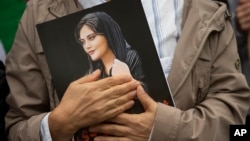
A group of 54 Iranian lawyers who expressed support for the family of Mahsa Amini after she died in police custody have been summoned by judicial authorities to explain social media posts, a move activists say is part of a campaign by officials to pressure them amid continued unrest over the suppression of women's rights by the Islamic regime.
The Norway-based Hengaw group, which monitors rights violations in Iran's Kurdish regions, reported on July 14 that the lawyers from Bukan in West Azerbaijan Province were being investigated for publishing "images and content against public modesty" rules.
In a statement posted online in September 2022, just days after Amini died after being detained for an alleged violation of the mandatory hijab law, the lawyers said they were ready to provide Amini's family with legal representation while condemning "illegal behavior by any institution and organization," an apparent reference to state pressure on the family to accept its official explanation -- health reasons -- for her death.
The family and witnesses of Amini's arrest say she was beaten during her apprehension and had no history of health problems.
Hengaw quoted unnamed "informed sources" as saying the Bukan prosecutor had "continuously put pressure on these lawyers with contradictory justifications" since the letter was published.
Hengaw said the lawyers must appear in court between July 11 and July 16.
The summoning of the lawyers in Bukan comes amid increased state pressure on independent lawyers who have been critical of state repression and those who have defended protesters arrested in the brutal state crackdown on anti-establishment protests.
Dozens of lawyers have been detained during the crackdown. The majority were released under an amnesty declared by Supreme Leader Ayatollah Ali Khamenei in February but since May, the authorities have summoned over 100 lawyers across the country to appear.
Some of the lawyers who have been summoned have said that the proceedings were mostly conducted by the security court located in Tehran's notorious Evin prison, with no specific charges stated.
'Not Our Enemies': Iran's Crackdown On Protest By Disabled War Veterans Triggers Outrage
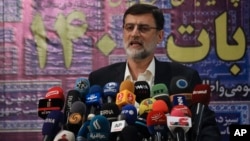
Iranian veterans of the devastating war with Iraq in the 1980s are widely regarded as heroes, with tens of thousands disabled by chronic illnesses caused by exposure to chemical weapons used during the conflict.
But when dozens of veterans staged a protest on July 8 in Tehran over what they said were their inadequate pensions, police violently broke up the rally and reportedly fired tear gas at the demonstrators.
Amateur videos posted online appeared to show a protester lying on the ground and struggling to breathe. Many veterans suffer from respiratory and lung diseases.
Other protesters were heard chanting "criminals," in an apparent reference to the authorities. Several people were reportedly detained.
The government's harsh response to the veterans' protest has triggered widespread anger in Iran, which has been the scene of regular protests over soaring inflation and rising poverty and unemployment.
"I was speechless. It was very upsetting," said a veteran of the 1980-88 Iran-Iraq War who spoke to RFE/RL's Radio Farda. "Our children and families see this and they ask, 'Why did you fight during the war?'"
The veteran, who spoke on condition of anonymity for fear of retribution, said the disabled veterans staged the protest over plans by the authorities to slash some of their benefits. Others called on the government to pursue compensation for the veterans from Iraq, which started the conflict by invading Iran.
"[Authorities] make promises, they spent our money elsewhere or for their own purposes, we don't know what they're doing. They're decreasing our medical and living assistance," the veteran said in a telephone interview from Tehran.
The crackdown on the veterans' protest, which was held outside the offices of the state-run Foundation for Martyrs and Veteran Affairs, led to an outpouring of anger on social media.
Prominent actor Parviz Parastuyi, a veteran of the war with Iraq, blasted Iranian Vice President Amir Hossein Ghazizadeh Hashemi, who is the head of the Foundation for Martyrs and Veteran Affairs. He said the protesters are "not our enemies, they're disabled veterans."
"They pushed back the enemy so that Iran remained Iran," Parastui said in a statement published by Iranian media on July 9.
Mohsen Bozorgi, an official at the Foundation of Martyrs and Veterans Affairs, said they had held talks with the protesters, who he claimed left the meeting "calmly."
Bozorgi also said the issue of war compensation is a complicated international matter that is "in no way" related to the foundation. But he added that the foundation considers pursuing the demands of the veterans as its "national mission."
He also criticized critics who he said reacted "hastily" without having "sufficient information."
The hard-line Tasnim news agency, which is affiliated with the Islamic Revolutionary Guards Corps (IRGC), on July 11 denied that the police had used tear gas to disperse the protesters. But the agency said the authorities were investigating whether pepper spray was used.
Tasnim claimed the police had intervened due to a "conflict" between several of the protesters.
Iranian officials often describe disabled veterans of the war with Iraq, which killed or wounded around 1 million people on both sides, as living martyrs. Iran's Supreme Leader Ayatollah Ali Khamenei has previously said that "sometimes their virtues are even greater than the martyrs."
But many war veterans have complained of economic hardships amid the deepening economic crisis in Iran. They have staged several protests in recent years and called on the authorities to improve their living conditions.
An unknown number of veterans, who survived the mustard and nerve-gas attacks launched by Iraqi dictator Saddam Hussein during the war, died during the coronavirus pandemic.
"It is interesting that [the authorities] declare that everything we have is because of the martyrs, veterans, those who sacrificed their lives….But in practice there is no such thing," an online petition signed by a group of war veterans said.
Sons Issue Plea For Iranian Activist Father To Be Taken Off Death Row
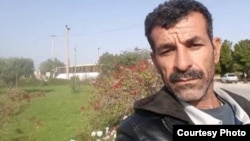
The three young sons of activist Abbas Deris have appealed to the authorities not to carry out the execution of their father -- which would leave them as orphans -- as fears grow his death sentence on charges he denies may be imminent.
In a video circulated on social media, one of the three sons speaks as they all look down at the carpet they're sitting on and says we are "begging for our father's life to be spared. Our mother died from a stroke triggered by the sentence handed to our father. We have no one left but our father."
Deris and his brother, Moshen, were accused of "waging war against God, disrupting order, and participating in the murder of Reza Sayadi," a member of the special police forces during nationwide unrest in November 2019.
The plea comes a day after Fereshteh Tabanian, a lawyer for Deris, said Branch 39 of the Supreme Court confirmed the death sentence without giving any regard to objections she filed in the case on July 5.
Deris's mother also released a video in which she called for her son's execution to be commuted.
The November 2019 protests saw thousands of Iranians in more than 100 cities and towns protest the government's sudden decision to raise gas prices. The protests quickly turned political, with many chanting against the Islamic regime and its leaders.
Iranian Human Rights has confirmed the death of 324 citizens, including 14 children, in the protests, but the Reuters news agency has estimated through its research that the actual number of people killed was around 1,500.
Iran, which has been rocked over the past year by demonstrations over deteriorating living conditions coupled with discontent over a lack of freedoms, especially women's rights, has been sharply criticized for a jump in executions as it tries to quell the unrest.
The wave of executions has sparked outrage among rights activists and many Western governments, who have called the legal proceedings against the accused "sham" trials where proper representation is not always granted and decisions are rushed behind closed doors.
Norway-based Iran Human Rights said on June 1 at least 307 people have been executed in 2023, a 76 percent rise compared with the same period last year.
Written by Ardeshir Tayebi based on an original story in Persian by RFE/RL's Radio Farda
- By RFE/RL
In Uganda, Iranian President Attacks West On LGBT Rights
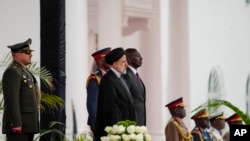
Iranian President Ebrahim Raisi on July 12 launched into a condemnation of Western attitudes on homosexuality during a visit to Uganda, which has just introduced some of the harshest anti-gay laws in the world.
"The West today is trying to promote the idea of homosexuality and by promoting homosexuality they are trying to end the generation of human beings," Raisi said.
Ugandan President Yoweri Museveni signed a law in May making "aggravated homosexuality" a capital offense and same-sex relations punishable by life in prison, triggering outrage among human rights groups, the United Nations, LGBT activists, and Western powers.
Raisi has begun a rare visit to Africa as his country, which is under heavy U.S. economic sanctions, seeks to deepen other partnerships around the world. Raisi's visits to Kenya and Uganda on July 12 are the first to the African continent by an Iranian leader in more than a decade.
He will also visit Zimbabwe on his trip to Africa, which he described as a "continent of opportunities" and a great platform for Iranian products. "None of us is satisfied with the current volume of trade," he said.
With reporting by AFP and AP
Editors' Picks
Top Trending
U.S.-Sanctioned Russian Millionaire Found Dead In His Office
2Fire At Military Base In Crimea Forces Evacuations, Highway Closure, Says Moscow-Installed Official
3Wagner Troops In Belarus 'Want To Go West' Into Poland, Lukashenka Quips During Meeting With Putin
4No 'Sports Outside Politics': Ukrainian Soccer Giant Dynamo Kyiv Turns Down Serbian Training Offer
5Erdogan Looks West. What Does It Mean For Putin?
6'Something Will Happen': Fears In Poland As Wagner Trains Belarusian Soldiers '5 Kilometers' From Border
7Ukraine's Counteroffensive Is Going Slowly. Is That A Problem?
8U.K. Intelligence Estimates Up To 20,000 Convicts Recruited By Wagner Were Killed In A Few Months
9From Logistics To Psychology, Effects Of Crimea Bridge Blast Will Linger
10Crimea Bridge 'Must Be Neutralized,' Zelenskiy Says
Subscribe


